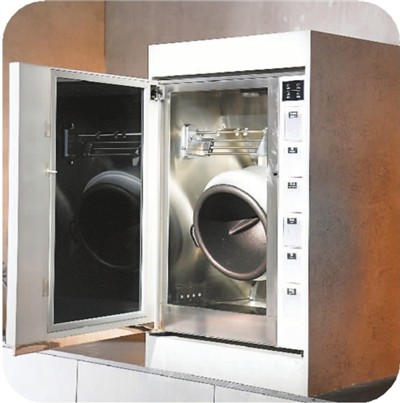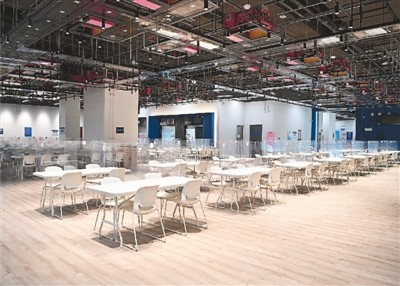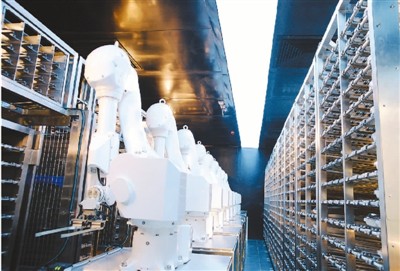




- BRNN
- BRI News
- BRNN News
- Database
Official Documents Polices and Regulations
Inter-government Documents International Cooperation BRI Countries
Business Guide Economic Data BRI Data
Trade
Investment Projects Latest projects
Cases - Content Pool
The application of advanced technologies in China’s catering industry is empowering smart restaurants across the country.

Photo shows a cooking robot developed by Shanghai Aican Robot (Group) Co. Ltd. (Photo courtesy of the interviewee)
The smart restaurant inside the Main Media Center at the Beijing 2022 Olympic Winter Games attracted global attention during the mega event. Inside the smart restaurant, robot chefs had the ability to cook over 200 varieties of delicious Chinese and Western dishes. Meanwhile, robots hanging from the ceiling could deliver ordered cuisines individually to each diner.
To ensure that the robot chefs were able to perform stir-frying techniques like their human counterparts, the research and development team for the smart restaurant applied the use of software to simulate all kinds of different stir-frying scenarios and conducted numerous experiments. The team finally developed systems that enabled the robots to toss food in a pan, accurately control the level of heating and fry up dishes comparable to the level of quality representative of an experienced human chef’s craftsmanship.
In fact, smart restaurants are not something unique and special to the Beijing 2022. In a smart restaurant in Beijing operated by the hotpot restaurant chain Haidilao, which is famous for its considerate services, robots are used to prepare food and deliver dishes to customers, while at the same time human waiters and waitresses offer all-round services to them. A traditional Haidilao outlet needs over 40 employees to operate smoothly, but some 20 workers are enough for a smart restaurant.

Photo shows the smart restaurant inside the Main Media Center at the Beijing 2022 Olympic Winter Games. (Xinhua/He Changshan)
Feng Enyuan, honorary vice-chairman of the China Cuisine Association, pointed out that smart restaurants refer to those restaurants using technologies to solve existing problems in the catering industry.
Some restaurants have transformed themselves into smart ones by cooperating with Chinese e-commerce giant Alibaba Group’s local life service company, which focuses on helping restaurants realize the digital transformation of their ordering and food production monitoring processes.
“We realize the digital transformation of traditional restaurants by providing digital solutions, such as QR code-based food ordering and payments, Internet of Things (IoT) devices, and kitchen display systems, helping restaurant owners cut costs and improve efficiency,” said Yin Fei, an executive at Alibaba’s local life service company.
In addition to catering enterprises, some tech firms have also provided solutions to smart restaurants by leveraging their tech strengths. Chinese artificial intelligence (AI) firm iFlytek has rolled out intelligent products such as AI-powered telephone robots and robot waiters, which have been gradually introduced onto the floors of some famous catering enterprises.

Photo shows robots working in a smart restaurant operated by the hotpot restaurant chain Haidilao. (Photo courtesy of the interviewee)
Shanghai Aican Robot (Group) Co. Ltd., a company that develops, produces and sells kitchen appliances, has developed a type of cooking robot that uses an intelligent control system, and which can adjust the speed and motion of stir-frying as well as the amount of oil and salt added according to customers’ individual needs, according to He Qing, chairman of the board at the company.
Having cooperated with famous chefs from around the country, the company has been able to convert their cooking processes into a machine language and reproduce the flavor of local cuisines that meets customers’ specific demands, He introduced, adding that the company has also moved chefs’ recipes onto cloud servers.
Feng pointed out that in order to promote the building of smart restaurants, it is more important to support the digitalization of the whole catering industry.
For example, Haidilao is now gradually promoting its order management system to reach all outlets, while using a digital means to assist in the procurement of ingredients. A screen in each of Haidilao’s smart restaurant shows ingredients in stock and the amount of different ingredients consumed.
“Big data helps us understand customers’ preferences for different ingredients. On this basis, we can formulate a targeted procurement plan, ensuring fresh ingredients while lowering procurement costs,” said a staff from the company.

Tel:86-10-65368972, 86-10-65369967